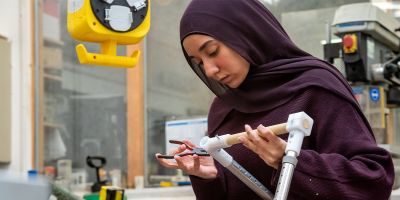A low-cost life support machine for patients with covid

A device that helps desperately sick patients breathe and costs around £150 to manufacture could revolutionise care in low to middle income countries.
It has been designed to provide therapeutic oxygen support to patients severely ill with Covid-19, pneumonia or other forms of respiratory distress - and was developed using the principles of “frugal engineering” by a team of scientists and clinicians at the University of Leeds, Leeds Teaching Hospitals NHS Trust and Bradford Teaching Hospitals NHS Foundation Trust .
Stripped of unnecessary functionality, the device has been made for lower-resourced healthcare settings, where there is a critical shortage of equipment to support patients’ breathing.
The pandemic is highlighting the devastating shortage of medical equipment that can help people breathe.
Known as the Leeds LeVe, it delivers a form of oxygen therapy known as CPAP or continuous positive airway pressure. Recent scientific reports have shown that CPAP can help save the lives of patients moderately or severely ill with Covid-19.
It has passed safety tests, and a trial evaluating its effectiveness on sick patients is due to start shortly in Africa.
'Life-saving device'
Dr Tom Lawton, Consultant in Critical Care and Anaesthesia at Bradford Teaching Hospitals NHS Foundation Trust and a member of the research team, said: “CPAP has become one of the mainstays of respiratory treatment of Covid-19 during the pandemic, but can be oxygen-intensive which is an issue in low-income settings or where health systems become overwhelmed.
“Low-resource devices like this have already saved many lives in the pandemic and making them available across the world at low cost has the potential to save more, both in Covid-19 and potentially other respiratory diseases too.”
The Leeds LeVe system has been designed to make efficient use of scarce oxygen supplies.
Remarkably simple technology
The Leeds system is remarkably simple. It is made up of an oxygen mask, tubing, filter and a small electric fan blower that can generate a flow of air at a raised pressure. Oxygen is added either from a cylinder or oxygen concentrator, a machine the size of a suitcase that takes in air, removes the nitrogen - and pumps out an oxygen supply.

The Leeds LeVe sysesm with mask, tubing, filter and a small electric fan blower. Credit: University of Leeds
A patient receives the air and oxygen mix at a slightly raised pressure, to keep their airway open and lungs oxygenated. Conventional breathing support systems cost from around £800 to more than £30,000 for the mechanical ventilators found in intensive care units. Those costs and the way oxygen supplies are configured in many clinics and hospitals in poorer health economies have resulted in a dire shortage of life-support equipment.
Dr Pete Culmer, Associate Professor in the School of Mechanical Engineering at the University of Leeds and a member of the project’s engineering team, said: “The pandemic is highlighting the devastating shortage of medical equipment that can help people breathe.
"This project has brought together a team of doctors, scientists and engineers, from the UK and Uganda, to develop a simplified, easy-to-maintain device
“Our hope is that the device will revolutionise the care that can be offered to people in low to middle income countries who are experiencing respiratory distress.”
Very few sick patients receive oxygen
A patient trial involving people with breathing difficulties is planned to start shortly at the Mengo Hospital, a not-for-profit health institution in Kampala, Uganda.
Dr Edith Namulema, an Epidemiologist leading the clinical trial, said: “Since the outbreak of the Covid-19 epidemic, the demand for oxygen is quite high. Looking at the available infrastructure at Mengo Hospital, for every 20 patients requiring extensive oxygen needs, only three access it.
“The situation is worse in the lower-level health centres where none of the patients that visit these facilities can access these services.”
The trial will evaluate whether the device is as clinically effective as other CPAP breathing aids.
Professor Nikil Kapur, from the School of Mechanical Engineering at the University of Leeds who has led the project, said: “Designing equipment that remains sustainable over the long term is vital. As well as providing for patients now, we want equipment that will continue to support patients in the future. This includes considering the training of healthcare professionals and the long-term maintenance of technology.
“We are working with colleagues from these settings to ensure we are meeting these requirements."
Professor David Brettle, Chief Scientific Officer at Leeds Teaching Hospitals NHS Trust, said: “The Leeds LeVe CPAP device is the culmination of a fantastic collaboration between academia and health in direct response to the covid pandemic.
"In the UK we often take for granted access to the necessary health technology, but even relatively simple technology is often not available in low-and middle-income countries.
“This new development should help to level the playing field in this respect, not just for Covid but for other respiratory conditions, helping to improve care worldwide and ultimately saving lives.”
Further details
A preprint scientific paper - The LeVe CPAP system for oxygen-efficient CPAP respiratory support: Development and pilot evaluation - which describes the engineering principles of the device is available online on the MedRxiv website. As a preprint, it has not yet been subject to peer review.
The project has received funding from the UK’s Global Challenges Research Fund.
For further details, please contact David Lewis in the press office at the University of Leeds: d.lewis@leeds.ac.uk or on +44 (0)7710 013287.




